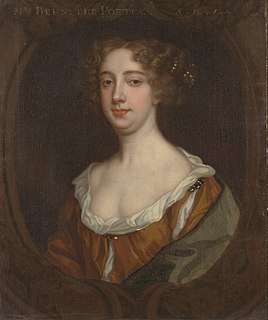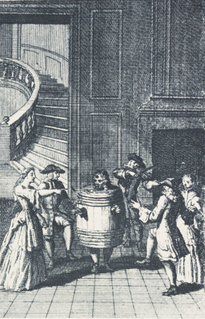Related Research Articles

Astraea, Astrea or Astria, in ancient Greek religion, is a daughter of Astraeus and Eos. She is the virgin goddess of justice, innocence, purity and precision. She is closely associated with the Greek goddess of justice, Dike. She is not to be confused with Asteria, the goddess of the stars and the daughter of Coeus and Phoebe. The main belt asteroid 5 Astraea is named after her, and her name was also suggested for the planet Uranus.

Aphra Behn was an English playwright, poet, prose writer and translator from the Restoration era. As one of the first English women to earn her living by her writing, she broke cultural barriers and served as a literary role model for later generations of women authors. Rising from obscurity, she came to the notice of Charles II, who employed her as a spy in Antwerp. Upon her return to London and a probable brief stay in debtors' prison, she began writing for the stage. She belonged to a coterie of poets and famous libertines such as John Wilmot, Lord Rochester. Behn wrote under the pastoral pseudonym Astrea. During the turbulent political times of the Exclusion Crisis, she wrote an epilogue and prologue that brought her into legal trouble; she thereafter devoted most of her writing to prose genres and translations. A staunch supporter of the Stuart line, she declined an invitation from Bishop Burnet to write a welcoming poem to the new king William III. She died shortly after.

"Restoration comedy" is English comedy written and performed in the Restoration period of 1660–1710. Comedy of manners is used as a synonym for this. After public stage performances were banned for 18 years by the Puritan regime, reopening of the theatres in 1660 marked a renaissance of English drama. Sexually explicit language was encouraged by King Charles II (1660–1685) personally and by the rakish style of his court. Historian George Norman Clark argues:
The best-known fact about the Restoration drama is that it is immoral. The dramatists did not criticize the accepted morality about gambling, drink, love, and pleasure generally, or try, like the dramatists of our own time, to work out their own view of character and conduct. What they did was, according to their respective inclinations, to mock at all restraints. Some were gross, others delicately improper.... The dramatists did not merely say anything they liked: they also intended to glory in it and to shock those who did not like it.

Oroonoko: or, the Royal Slave is a short work of prose fiction by Aphra Behn (1640–1689), published in 1688 by William Canning and reissued with two other fictions later that year. It was also adapted into a play. The eponymous hero is an African prince from Coramantien who is tricked into slavery and sold to European colonists in Surinam where he meets the narrator. Behn's text is a first-person account of Oroonoko's life, love, rebellion, and execution. Oroonoko: or, the Royal Slave “centers on the unlucky love story of Oroonoko, an African prince, and the beautiful Imoinda.”
John Tatham was an English dramatist of the mid-17th century. He was a strong Cavalier.
Janet Margaret Todd OBE is a British academic and author. She was educated at Cambridge University and the University of Florida, where she undertook a doctorate on the poet John Clare. Much of her work concerns Mary Wollstonecraft, Jane Austen, and their circles.
Like Father Like Son may refer to:

Love-Letters Between a Nobleman and His Sister is an anonymously published three-volume roman à clef playing with events of the Monmouth Rebellion and exploring the genre of the epistolary novel. It has been attributed to Aphra Behn, but this attribution remains in dispute. The novel is "based loosely on an affair between Ford, Lord Grey of Werke, and his wife's sister, Lady Henrietta Berkeley, a scandal that broke in London in 1682". It was originally published as three separate volumes: Love-Letters Between a Noble-Man and his Sister (1684), Love-Letters from a Noble Man to his Sister: Mixt with the History of Their Adventures. The Second Part by the Same Hand (1685), and The Amours of Philander and Silvia (1687). The copyright holder was Joseph Hindmarsh, later joined by Jacob Tonson.
Thomaso, or the Wanderer is mid-seventeenth-century stage play, a two-part comedy written by Thomas Killigrew, The work was composed in Madrid, c. 1654. Thomaso is based on Killigrew's personal experiences as a Royalist exile during the era of the Commonwealth, when he was abroad continuously from 1647 to 1660.

John Hoyle was a bisexual lawyer in London and a lover of the writer Aphra Behn. Behn's relationship with Hoyle was the "dominating one" in her life.
The Town-Fopp: or, Sir Timothy Tawdrey is a Restoration comedy written by Aphra Behn and first staged in 1676. It deals with an unhappy marriage and its dissolution.
The False Count, Or, A New Way to play An Old Game, is a comedic play written by Aphra Behn, first performed in 1681 and published in 1682. It was staged by the Duke's Company at the Dorset Garden Theatre in London. The cast included William Smith as Don Carlos, James Nokes as Francisco, John Freeman as Sebastian, John Wiltshire as Antonio, George Bright as Baltazer, Cave Underhill as Guzman, Anthony Leigh as Guilion, Elizabeth Currer as Isabella and Margaret Osborne as Jacinta.

Sir Patient Fancy: A Comedy, is a comedic play written by Aphra Behn, first performed in 1678. It is Behn's first overtly political play. It was staged by the Duke's Company at the Dorset Garden Theatre in London with a cast that included Nell Gwyn as Lady Knowell, Anthony Leigh as Sir Patient Fancy, John Crosby as Leander Fancy, Thomas Betterton as Wittmore, William Smith as Lodwick Knowell, James Nokes as Sir Credulous Easy, John Richards as Curry, Elizabeth Currer as Lady Fancy, Mary Betterton as Isabella, Emily Price as Lucretia and Anne Shadwell as Maundy.

The Young King, or, The Mistake is a tragicomedy written by Aphra Behn. It was probably written during the 1660s, but was not staged until 1679. It explores notions of kingship and divine right, and gender and heroism.
John Bowman (1651–1739) was a British stage actor. He began his career in the Duke's Company at the Dorset Garden Theatre. In 1692 he married Elizabeth Watson, who acted under the name Elizabeth Bowman. He later switched to act at the Drury Lane Theatre. He is also referred to as John Boman.
Elizabeth Currer was an Irish stage actress of the Restoration Era. She was a member of the Duke's Company during the 1670s and subsequently part of the merged United Company from 1682. Although she was likely acting in London several years earlier than this, her first known role was in The Conquest of China in 1675. Due to the irregular spelling of the time her surname is sometimes written as Carrier, Corer and Currier amongst other variants.
George Bright was an English stage actor of the seventeenth and early eighteenth century. He specialised in playing "comic dullards, fops and bouncy servants". After beginning his career in Dublin he joined the Duke's Company at the Dorset Garden Theatre in 1679 and then became part of the merged United Company in 1682.
John Richards was an English stage actor of the seventeenth century. An early member of the Duke's Company in London, he was lured away to the new Smock Alley Theatre in Dublin by John Ogilby. He was back with the Duke's at the Dorset Garden Theatre from the mid-1670s, but while in Ireland he was able to play major roles his English performances were generally supporting parts.
Thomas Percival or Percivall was an English stage actor of the seventeenth century. He was a member of the Duke's Company from 1671 to 1682 and then the merged United Company until 1686. Throughout his career he was confined to playing supporting roles, never graduating to major parts. He was the father of the actress Susanna Verbruggen. In 1693, following his retirement from the stage, he was arrested for coin clipping, a capital crime, for which he was sentenced to hang at Tyburn. The intercession of his daughter with Mary II saw his sentence commuted to transportation, but before he reached Portsmouth he died of natural causes.
Emily Price was an English stage actress of the seventeenth century. She was a member of the Duke's Company between 1676 and 1682, acting at the Dorset Garden Theatre in London and then joined the merged United Company. She was a friend of the playwright Aphra Behn and appeared in several of her plays. She was billed as Mrs Price.
References
- ↑ Depledge, Emma, author. Shakespeare's rise to cultural prominence : politics, print and alteration, 1642-1700. p. 73. ISBN 9781108565509. OCLC 1043206588.
{{cite book}}:|last=has generic name (help)CS1 maint: multiple names: authors list (link) - 1 2 Todd, Janet (2018). The Works of Aphra Behn, Volume 1: Poetry. Routledge. ISBN 1351259466.
- 1 2 Pollack, Rhoda-Gale (1990). A sampler of plays by women. p. 46. ISBN 0820411728.
